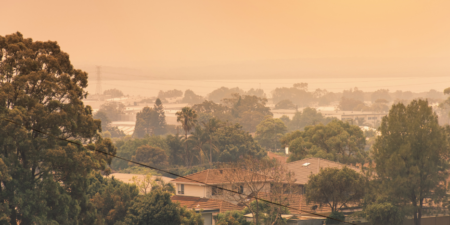Research from the University of Newcastle found that even small amounts of bushfire smoke can have large effects on our health.
Australians are no strangers to bushfires. When COVID-19 lockdowns began here in March 2020, many people were already used to face masks, having donned them during the 2019/2020 fire season to deal with bushfire smoke.
We are also familiar with some of the health risks associated with bushfire smoke. Alongside the loss of life, environmental damage, property damage and psychological impacts, the ‘Black Summer’ bushfires caused widespread health problems. In regional areas affected by the fires and by bushfire smoke, the number of heart attacks nearly doubled.
New insight into health risks
But as the frequency and severity of catastrophic fires increases, the health impacts of bushfire smoke need to be better understood. New research from the University of Newcastle has laid the groundwork for this better understanding by looking at how bushfire smoke affects the airways and heart, and how much (or little) exposure to bushfire smoke is required to have a negative impact.
The researchers looked at the effects of exposure to bushfire smoke over a short period (3 days) and a long period (14 days) and compared exposure to low and high concentrations of bushfire smoke.
According to the research, even just a few days of exposure to small amounts of bushfire smoke decreased heart function. The research also found that for people with asthma, short-term bushfire smoke exposure could increase both the risk and severity of attacks and reduce the effectiveness of asthma medication.
Bushfire smoke can be nearly impossible to avoid
The researchers hope that their findings will not only help to show the risk of bushfire smoke but will also help to find better treatment options.
This is important as it is almost impossible to completely avoid bushfire smoke during fire season, especially when the fires are as severe and widespread as they were during black summer. In 2019, wharfies in New South Wales were forced to stop working to protect themselves from the smoke, with the Maritime Union of Australia pushing for better protections for workers working in such smokey conditions.
Smoke can also affect people when they’re at home. For people in older houses, it can be especially difficult to keep smoke out as these houses can be drafty or poorly sealed.
They can also lack proper cooling systems, meaning that in the heat of bushfire season people have to choose between opening windows in order to cool their homes, or sacrificing a breeze to protect themselves from the bushfire smoke.
While air purifiers can help, they can be expensive. A better solution would be for the Government to improve building regulations and support people to retrofit their homes to make them less susceptible to bushfire smoke.
